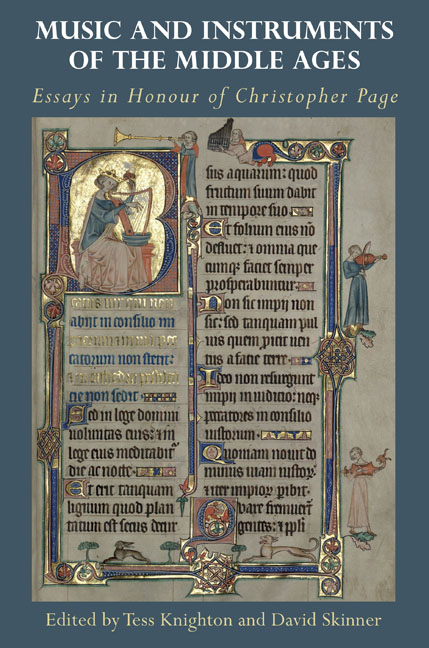Book contents
- Frontmatter
- Contents
- List of Illustrations
- List of Music Examples
- List of Tables
- List of Contributors
- List of Music Manuscript Sigla
- Acknowledgements
- Introduction
- SONGSTERS AND THEIR REPERTORIES
- CLOSE READINGS
- CREATING POLYPHONY
- MUSIC AS CULTURAL PRACTICE
- Works Cited
- Works by Christopher Page
- Index
- Tabula Gratulatoria
- Studies in Medieval and Renaissance Music
17 - From Page to Sound: Performing the Masses of Walter Frye
Published online by Cambridge University Press: 24 November 2020
- Frontmatter
- Contents
- List of Illustrations
- List of Music Examples
- List of Tables
- List of Contributors
- List of Music Manuscript Sigla
- Acknowledgements
- Introduction
- SONGSTERS AND THEIR REPERTORIES
- CLOSE READINGS
- CREATING POLYPHONY
- MUSIC AS CULTURAL PRACTICE
- Works Cited
- Works by Christopher Page
- Index
- Tabula Gratulatoria
- Studies in Medieval and Renaissance Music
Summary
In 1992 I published an article analysing the style of Walter Frye, a composer whose music spoke to me with a strong and distinctive voice. At that point very little of Frye's music had been recorded, so my experience of it was almost entirely ‘in the mind’. Several years later, Christopher Page, in an act of characteristic kindness, engineered for me the beginning of a relationship with Hyperion Records that continues to this day, and that has allowed me, via my ensemble the Binchois Consort, to put my conviction in Frye's music into practice. More than a quarter of a century on, and with recordings of all Frye's Masses in our back catalogue, I would like in this article to revisit his style with the benefit of hindsight sharpened by the experience of performance.
I should precede the observations that follow with a clear caveat: in offering them I make no claim to a ‘correct’ approach to performing the passages I shall discuss, much less to having ‘discovered’ Frye's musical thought processes. Others will see (and indeed have now seen) different interpretative possibilities in this music; and Frye's own approach remains locked in a past whose musical priorities were as redolent of their time as ours will ultimately prove to be of our own. But in approaching this topic here I am reminded of an important lesson I learned from the dedicatee of this volume: that however unattainable the sounds of the past may be, we can nevertheless, in evoking them today, open up possibilities of understanding which would otherwise have remained closed to us. In the end it is inevitably the sound of this music – however broadly conceived – that underpins our desire to engage with it, and that opens up heuristic possibilities to do so.
Writing about performances cannot but be an exercise in incompletion, requiring as it does phenomena beyond itself for proper intelligibility.
- Type
- Chapter
- Information
- Music and Instruments of the Middle AgesEssays in Honour of Christopher Page, pp. 405 - 434Publisher: Boydell & BrewerPrint publication year: 2020



